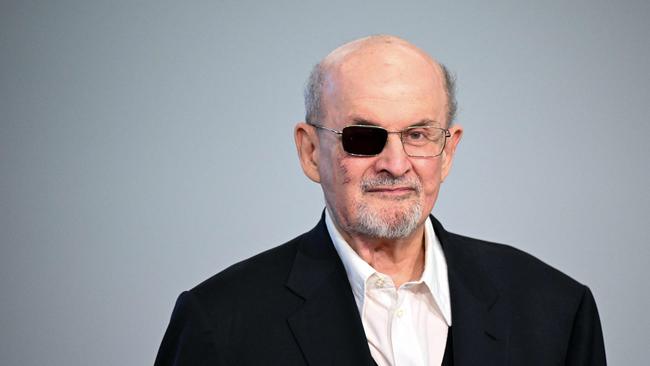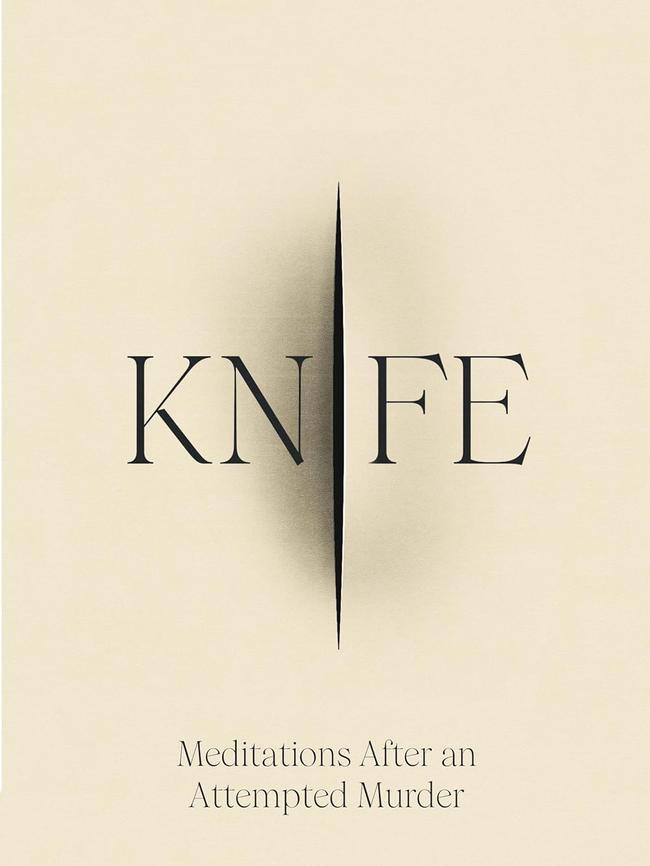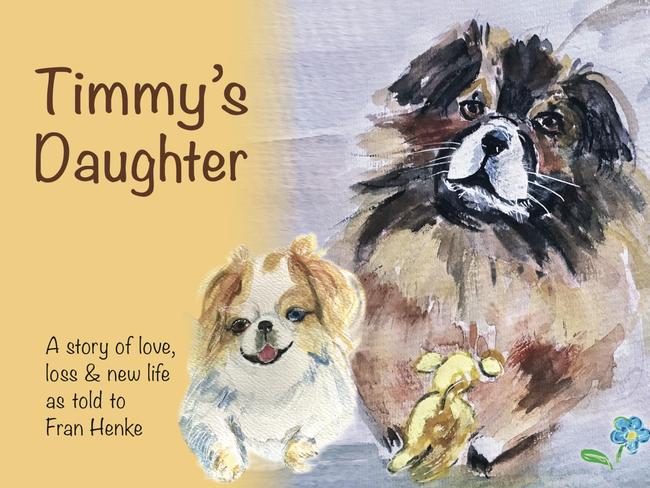
The Booker Prize-winning author said his eye was left hanging down his face “like a soft-boiled egg”.
You can just see it, can’t you?

In the first few pages, he describes the morning of August 12, 2022, when he was onstage at the Chautauqua Institution in upstate New York, preparing to give a lecture on the importance of keeping writers safe.
A man in black clothes and a black mask came rushing down the aisle.
Salman’s first thought?
“So it’s you. Here you are.”
Because he had been expecting it forever. The Indian-born British-American author, 76, spent years in hiding after the 1988 publication of The Satanic Verses. He’d long been a target. Yet his second thought was: “Really? It’s been so long. Why now, after all these years?”
Just when he thought he could live more freely, an assailant arrived, and he was, “approaching fast … a sort of time traveller, a murderous ghost from the past”. It had been 33 years since the Ayatollah issued the infamous fatwa.
In his book, Knife, published here by Penguin Random House, Salman says: “I continue to face him. I never turn by back on him. There are no injuries on my back.”
I was amazed to read that. Does he think that we’d think he was some kind of coward if he – an unarmed man in his 70s – tried to get away? We wouldn’t! Of course we wouldn’t.
Or does he mean: “When something like that happens, you go into shock. You just can’t move.”
Salman says he did not see the knife, and thought for moment that “I’d just been hit by someone who really packed a punch.”
“Now I know that there was a knife in that fist. Blood began to pour out of my neck,” he writes.
He was aware of “liquid splashing onto my shirt” and he worried that it would be ruined, which amuses him, but that’s surely evidence of his determination to live.
He says the knife in the eye was “the cruellest blow … the blade went all the way to the optic nerve, which meant there was no possibility of saving the vision. It was gone.”
In case you’re wondering what a near-death experience feels like, he says: “I thought, I’m dying. It didn’t feel dramatic or particularly awful. It just felt probable. Yes, that was very likely what was happening. It felt matter-of-fact.
“There was nothing supernatural about it. There was no tunnel of light” and no feeling of “rising out of my body”.
Hadi Matar, a 26-year-old New Jersey resident, has been charged with stabbing him. He has pleaded not guilty. The two men are likely to come face-to-eyepatched-face when the matter comes to trial.
Salman remains an advocate for freedom of expression but knows how difficult it has become for anyone to have their say.
“A lot of people, including a lot of young people, I’m sorry to say, have formed the opinion that restrictions on freedom of speech are often a good idea,” he told the BBC this week.
“Whereas of course, the whole point of freedom of speech is that you have to permit speech you don’t agree with.”
The book is slim, elegant, and essential.
■ ■ ■

In other rather fabulous book news, the ARA Historical Novel Prize has become the richest individual literary prize in Australasia. You’re not going to believe it, but the total prize pool is now $150,000.
The overall winner gets $100,000, which is far, far, far more than the average book advance, and absolutely life-changing money. It comes from ARA, the building group.
Big cheer for Edward Federman, executive chair and CEO, who says: “I am proud to support The ARA Historical Novel Prize, which continues to celebrate excellence in writing in this increasingly popular genre. Our vision for the prize is to reward the endeavours of outstanding Australian and New Zealand authors to create historical narratives which bridge together tales of our past and present.”
The awards are open to novels set 50 years before publication. The main prize has been won by Gail Jones (2023) and Tom Keneally (2022).
Entries close on Wednesday, 12 June.
■ ■ ■

Last week’s extract from Jane Cafarella’s memoir on “aching to fit” was well-received by readers. I was particularly delighted to hear from Frances Henke, who says Australia’s polio survivors would have been nodding along as they read about needing to buy different sized shoes - as well as being envious of her penpalship with Alan Marshall. Frances has just published her 25th book, Timmy’s Daughter, in time for her 80th birthday. Many happy returns!
■ ■ ■
A reminder that the Australian Outback Writers Festival short story competition closes on 26 April. Details online.
■ ■ ■
The Tassie Indie Authors are holding their annual book fair on Saturday May 4 in the Long Gallery at Salamanca Arts Centre. Dorothy Topfer, who wrote to tell me about it, will be promoting her latest story Sabine, “a contemporary tale about the challenges of being a young lawyer in a big firm in Sydney”.
■ ■ ■
Today’s pages: it’s Anzac Day next week, always a solemn occasion. We have an extract from a book by a soldier who fought in Vietnam. Do not miss The Beauties, by Lauren Chater, which examines King Charles II’s lust for his mistresses.







Salman Rushdie has written a book about having his eye plucked out by a maniac, and the language is beautiful, because of course it is.